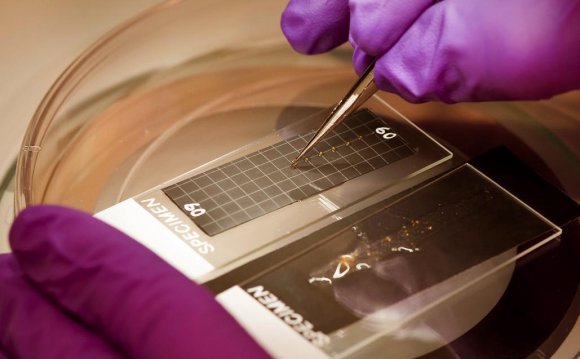
Food, agricultural and biological engineering is not just about farming. It can be about any subject in the life sciences that interests you - from the food industry to medicine to space travel.
FAB engineers advance engineering in food, biological and agricultural systems, always striving to serve society and improve our environment. FAB graduates use their skills to identify and solve a range of engineering problems related to the production, processing and distribution of food and other products. Ohio State students have many curricular options, which include:
- Agricultural engineering can focus on one or more of three areas. They can focus on designing controlled facilities, like greenhouses for example, or they can focus on soil and water issues that affect plants, air and water, or their third option is to focus on machinery design to improve mechanical systems dealing with food production; and
- Food, biological and ecological engineering, where students study and design natural systems that provide societal services while benefitting the environment, crucial issues of food safety, food quality and food supply for an expanding world population.
- There is also a pre-med/vet option for students considering professional school upon graduation. Other student opportunities include taking summer classes at Stone Lab on Lake Erie, personalized counseling and small class sizes in major courses.
- FAB students have had co-ops, internships and full-time employment opportunities in companies including NASA, John Deere, Procter & Gamble and the Environmental Protection Agency.
Careers in Food, Agricultural and Biological Engineering
Potential employers for mechanical aspects of agricultural engineering include equipment manufacturers for farming, forestry, construction, transportation, global positioning, homeland security equipment, lawn, garden and recreational markets, and their distributors.
Students interested in learning about the relationship among soil, plants and air can find a career devoted to engineering solutions for environmental issues in agriculture, including designing controlled environments such as greenhouses, livestock facilities and storage structures to meet specific environmental or climatic conditions. Employment opportunities include positions with federal and state environmental agencies, consulting firms, manufacturers and suppliers of drainage, irrigation and related equipment.
Food engineers work for a very wide range of companies both foreign and domestic. Graduates use their skills to design sustainable and environmentally responsible food processes for manufacturing safe, tasty, healthy, convenient food products. As consumer awareness and demand for a safe and abundant supply of food have increased, so has the need for more food process engineers.
Students interested in the biological engineering specialization will have opportunities in all career areas having a biological component, even medicine. Biological engineering students can concentrate on a wide variety of career areas, including alternative fuels, bio research, biotechnology, bio-medical applications, and of course, our department’s historically excellent preparation for admission to veterinary, medical, dental, or optometric professional schools.
Ecological engineering students may focus on the design and restoration of natural ecosystems like streams, wetlands, and coastal systems, as well as water quality and environmental contamination through the design, development, and management of ecosystems. Graduates work for government agencies such as the Environmental Protection Agency, the United States Department of Agriculture, and the Army Corps of Engineers and environmental consulting firms.
Degrees Offered
Bachelor of Science in Food, Agricultural and Biological Engineering
Combined BS/MS in Food, Agricultural and Biological Engineering
Master of Science in Food, Agricultural and Biological Engineering
Doctor of Philosophy in Food, Agricultural and Biological Engineering
Research
Advanced Bioenergy and Biobased Products - As the importance of renewable sources for energy and materials increases, research and industry partnerships come together in this signature area to develop biomass-based advanced energy technologies and value-added biobased products such as fuels, specialty chemicals, and fiber products.
Environmental Quality and Sustainability - Work in this signature area seeks to understand, protect, and remediate the environment and ecosystems to ensure long-term sustainability. At the core of this effort is the realization that sustaining population and economic growth must be balanced with the preservation of natural resources and environmental assets.
Food Security, Production and Human Health - This signature area focuses on improving agricultural production; enhancing the quality of food and feed; ensuring an adequate, affordable, and safe food supply; and maintaining agrosecurity to ensure food security and the basics of nutritional health for a growing global population.









